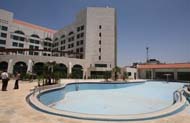 http://www.miftah.org/Display.cfm?DocId=22768&CategoryId=3
http://www.miftah.org/Display.cfm?DocId=22768&CategoryId=3| Date posted: November 01, 2010 By Joharah Baker for MIFTAH | |
Ramallah is booming. With each new passing day another restaurant, another hotel or another high fashion boutique is opening up in this bustling West Bank city. Road works have plagued motorists and pedestrians alike for months now, with new roads opened while others have been rehabilitated and widened, saplings planted strategically along the islands between the lanes and freshly painted lines designating either side of the dark asphalt streets. There is no doubt, Ramallah is thriving, the urban expansion accelerated at an almost frantic speed. One blink and another building is rising towards the clouds.
This is all good and fancy if it weren't for the sinister implications behind it. All cities expand at the peripheries, spreading out to accommodate a growing population and its equally growing demands. But in Ramallah, the peripheries are all but locked down, with the expansion abnormally swelling in the center. This is because the size and shape of Palestinian cities was defined long ago with the swift stroke of a pen during the Oslo Accords. Areas A, B, and C have become the letters from hell for Palestinians who are now shackled to agreements that bind them in an ever consolidated occupation rather than bring them closer to freedom. So, instead of the urban development expanding horizontally as well as vertically, there is mostly vertical construction, high rise buildings swallowing up the already cramped space, leaving at times mere slivers of sunshine pushing through the shadows of uncharacteristically large edifices.
The expansion is unnatural, not only because of the forced urban planning that prohibits natural growth outwards but because the fear is that, as Ramallah grows and flourishes, it will take the place of Palestine's real capital, Jerusalem. For all practical purposes, this has begun to happen already.
Last month, the first luxury chain hotel opened up in the city, the prestigious Movenpick is huge, with bars, restaurants and a spacious swimming pool. The Swiss chain hotel hardly caters to the Palestinians but rather to the many diplomats, NGO and aid agency workers and businesspeople that have been increasingly flocking to Ramallah for meetings and donor pledges over the past several months. The phenomenal number of new restaurants in Ramallah is also mind boggling given the actual Palestinian population of the city and its suburbs of nearly 300,000. While there is a small sector of Ramallah-residents who do have the means to frequent the city's pricey restaurants, it is the expatriate population that the owners are really looking to.
Again, this is great in any growing economy, except in this case, it indirectly means the exclusion of Jerusalem. As Ramallah blooms, Palestinian east Jerusalem inversely declines and there is not much the Palestinians are or can do about it. It is no secret that Israel has, for years, been systematically isolating Jerusalem from its West Bank surroundings in an attempt to sever ties between what they deem as their united capital and Palestinian aspirations to make it their own. As a result, the city has been physically separated from Ramallah (and Bethlehem) by airtight checkpoints and the separation wall, which keeps West Bankers almost completely out. Then there is the economic exclusion, which entails the ban on most Palestinian goods entering Jerusalem, the high property taxes imposed on Jerusalemites that not only bar them from flourishing but basically keep them struggling just to keep their heads above water. Restrictions imposed on construction, travel, residency rights and businesses not to mention the inextricable dependency of the Palestinian economy on Israel in Jerusalem have made it all but impossible to create a strong, viable and independent economic system in the city. Even small gestures such as Prime Minister Salam Fayyad's efforts to rehabilitate two Palestinian schools in Jerusalem were met with angry opposition by Israel's right wing elements that reject any form of Palestinian Authority involvement in the city.
In an attempt to even further isolate Palestinians from Jerusalem, a bill proposed by a right wing Israeli minister is calling for a ban of Palestinian tour guides in the city, saying they present "anti-Israeli positions" to their tourist groups. If the bill goes through, this would mean official tourists groups would only have the option of state-approved Israeli tour guides churning out the Israeli version of Jerusalem's history. Palestinian history [both Muslim and Christian] would be minimized at best, completely disregarded at worst.
There are plenty more examples as to why Ramallah, as opposed to Jerusalem, is growing so quickly. The political implications are as calculated as they are insidious. The world is in agreement that the Palestinians should have their own state. Ramallah would definitely be a part of it. Jerusalem, on the other hand is the stickiest of sticky issues and Israel will hear nothing of any Palestinian involvement in there. Israel is doing its utmost to exclude Palestinians both physically and politically from the debate on Jerusalem by forcing its way into every nook and cranny of its eastern sector. With no real access to Jerusalem, Ramallah has been chosen, mostly by default, as the next best choice to build Palestine.
Still, the battle is not over. Down the line, Ramallah's growth can be just that – the growth of a major city, in spite of the hurdles it faces in urban expansion. The world, and Israel, can never be allowed to think, even for a moment that Palestinians will accept anything less than Jerusalem at their capital, no matter how much money flows into Ramallah. In these times, vigilance is required so that this is never an option.
Joharah Baker is a Writer for the Media and Information Department at the Palestinian Initiative for the Promotion of Global Dialogue and Democracy (MIFTAH). She can be contacted at mid@miftah.org
No comments:
Post a Comment